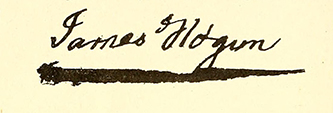D. 4 Jan. 1781

James Hogun, politician and Revolutionary soldier, a native of Ireland, settled in Halifax County around 1751. He married Ruth Norfleet of a prominent North Carolina family. One son, Lemuel, survived him.
There are no records of his life during the next twenty-three years after his arrival, but the fact that in 1774 he became a member of the Halifax County Committee of Safety suggests that he had become a person of some prominence. Hogun represented Halifax County in the Provincial Congresses of 20 Aug. 1774, 4 Apr. 1776, and November 1776, where he demonstrated an interest in military affairs. On 22 Apr. 1776, he was appointed first major of the Halifax militia by the Provincial Congress. In the November 1776 Congress he served on a committee appointed to study the reorganization of the militia.
Possibly because of his demonstrated interest in military affairs Hogun was appointed colonel of the Seventh North Carolina Continental Regiment on 26 Nov. 1776. He joined George Washington in July 1777 and participated in the battles of Brandywine and Germantown; it was said that in the latter conflict he conducted himself with "distinguished intrepidity."
In 1778, when the Continental Congress authorized four new regiments for North Carolina, Hogun was ordered home to aid in raising and recruiting the men. Assigned command of the first regiment to be raised, in August 1778 he marched his command into Washington's camp at White Plains, N.Y. In November, perhaps because they were poorly armed, his men were ordered to West Point to work on the fortifications. Major General Benedict Arnold, commandant of Philadelphia, requested Washington to send him a regiment or two of Continentals to guard the stores and perform the housekeeping chores in that city. Possibly because Hogun's command was made up of men whose enlistments were short, it was selected for this task. His regiment left the Hudson around the middle of December and arrived in Philadelphia sometime before 19 Jan. 1779.
On 9 Jan. 1779, the Continental Congress voted on two brigadier generals for the North Carolina Line. The state delegates, as directed by the North Carolina legislature, voted for Thomas Clark and Jethro Sumner, but the Congress selected Sumner and Hogun. Hogun, it was said, was chosen over Clark because he was senior in rank and had behaved well in the Battle of Germantown. But Thomas Burke, a delegate from North Carolina, had worked behind the scenes to frustrate Clark's appointment.
On 19 Mar. 1779, Hogun succeeded Benedict Arnold as commandant of Philadelphia. He served in that post until 22 November, when he was ordered to march the North Carolina brigade to the relief of Charles Town, S.C. He became a prisoner of war when Major General Benjamin Lincoln surrendered to the British on 12 May 1780, and was sent to prison camp on Haddrel's Point. The British offered to parole Hogun to some other community, but he declined, declaring that he wished to share the hardships of confinement with the men of his brigade. He feared that in his absence enemy recruiting officers might succeed in enlisting North Carolina prisoners of war for service in the West Indies. Hogun attempted to maintain a military atmosphere among his men, but his health began to fail during the winter of 1780. He died on Haddrel's Point.
James Hogun, who was relatively obscure in the years prior to the outbreak of the Revolution, rose rapidly in military affairs once the shooting war began, perhaps because of his role in North Carolina Whig politics. He was more of a competent and reliable officer than a spectacular soldier. He did his job in a quiet fashion, but he did it well.